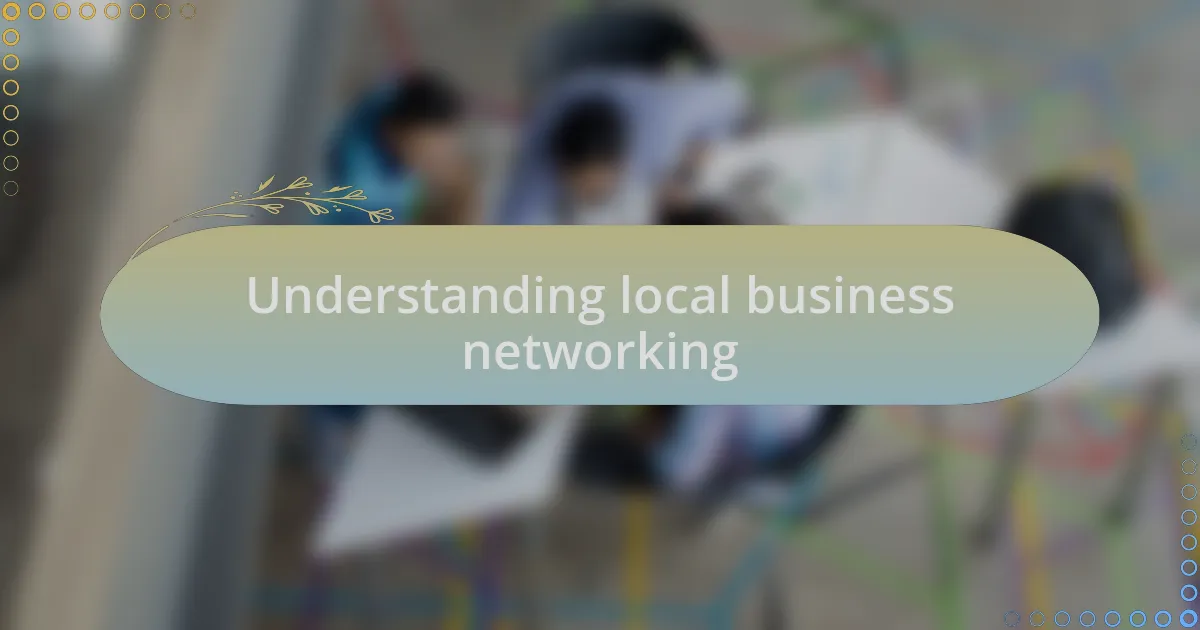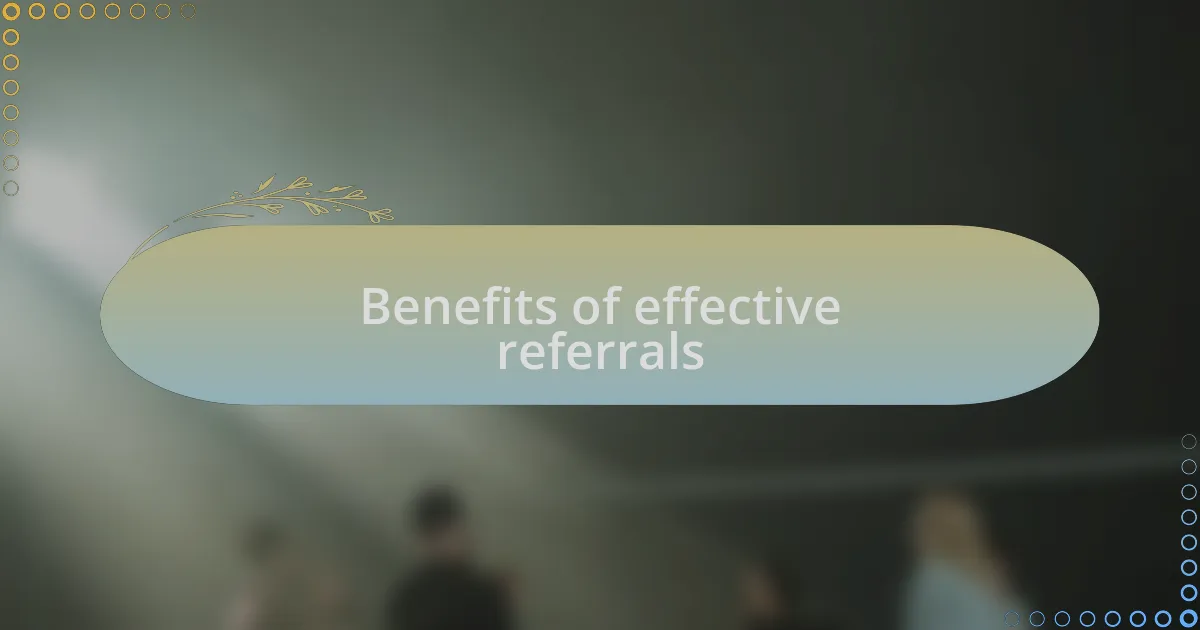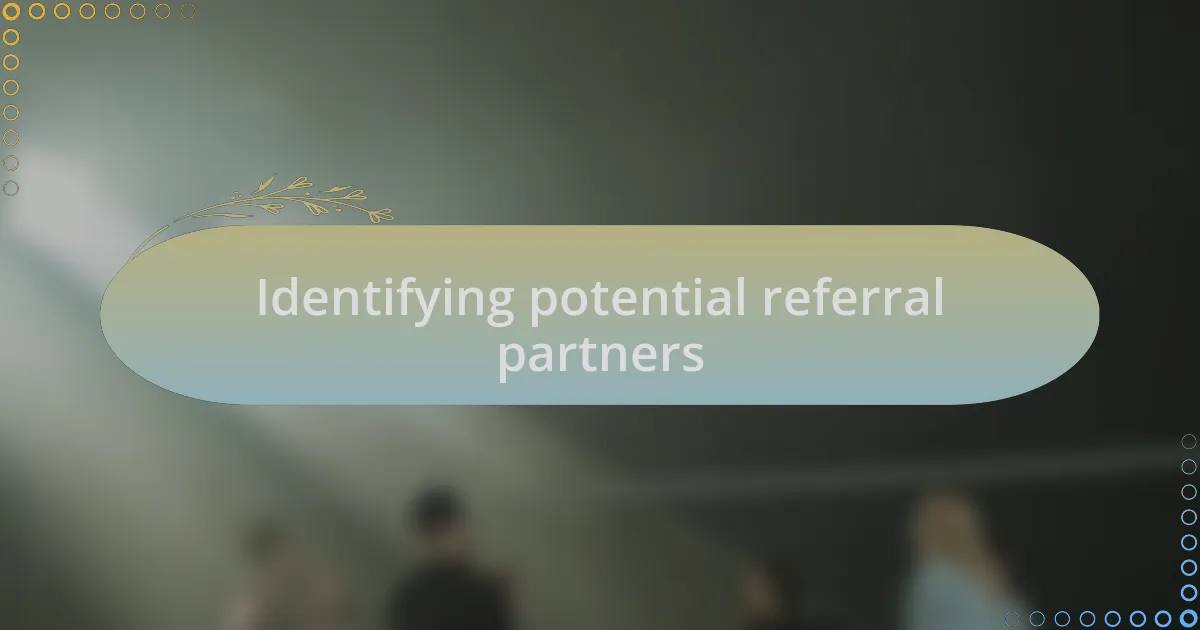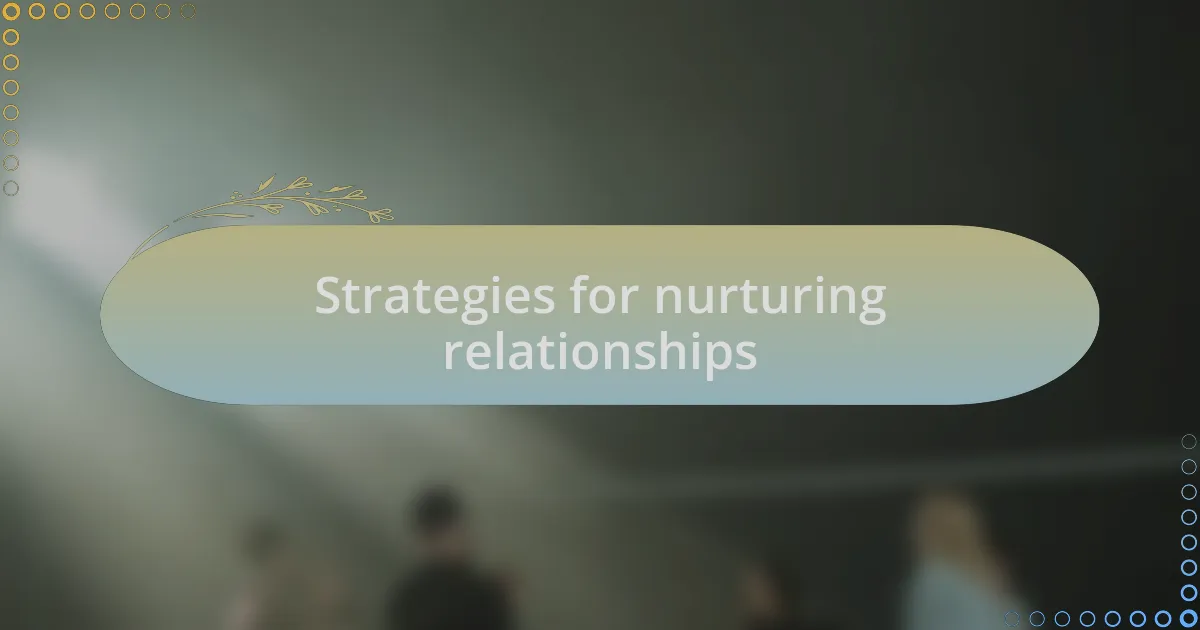Key takeaways:
- Building genuine relationships is essential for effective local business networking and can lead to valuable collaborations.
- Effective referrals create trust and can significantly reduce marketing costs, making it easier to grow businesses through warm leads.
- Regular check-ins and sharing resources strengthen relationships and encourage mutual support among network members.
- Tracking referral success through methods like spreadsheets and feedback enhances understanding of effective connections and improves strategies.

Understanding local business networking
Local business networking is more than just exchanging business cards at a meet-up; it’s about creating genuine relationships that foster mutual growth. I remember attending a local networking event where I connected with a baker who needed marketing advice. We ended up collaborating on a project that not only elevated her business but also solidified my position in the community.
Building a network requires time and effort, and it often starts with being curious about others’ needs and challenges. Have you ever wondered how many opportunities are missed when we focus solely on promoting our own services? In my experience, listening attentively and offering help before asking for anything in return has brought me invaluable connections.
I’ve found that effective networking often takes place in casual settings, where the pressure is off and conversations flow freely. One memorable instance was during a local farmers’ market when I struck up a conversation with a fellow vendor. That spontaneous interaction led to a partnership that I never anticipated, highlighting the importance of being open to new connections in everyday situations.

Benefits of effective referrals
Effective referrals can transform the way a local business operates. I remember a time I received a referral from a client who was thrilled with my services. That single connection not only brought in new clients but also solidified my reputation in the community, confirming what I had long believed: a warm introduction can be much more valuable than any advertisement.
When I think about it, referrals create a sense of trust that’s often hard to establish otherwise. There’s something about being recommended by someone a potential client respects that can make all the difference. In my journey, I’ve noticed that referrals usually lead to better client relationships, as they often come with a mutual understanding and aligned expectations.
Moreover, effective referrals can significantly reduce marketing costs for local businesses. Instead of pouring money into ads, I’ve found that nurturing existing relationships and incentivizing referrals leads to a more sustainable growth model. Have you ever considered how much easier business development can feel when you leverage warm leads instead of cold outreach? The impact has been profound for me, turning casual acquaintances into loyal clients.

Identifying potential referral partners
Identifying potential referral partners starts with assessing your existing network. I often look around at fellow business owners, service providers, or even community groups where I already have established relationships. It’s amazing how many potential partners I have overlooked simply because I’ve not visualized them as allies in my referral journey. Who in your circle could be a valuable ally?
Another effective strategy is diving into local events and networking meetups. I recall attending a local chamber of commerce gathering, and to my surprise, I met a real estate agent who later became one of my strongest referral partners. Engaging in these community-focused activities not only broadens your network but also fosters genuine connections. Think about your local landscape—what events have you attended, or could you plan to attend, that might unlock new partnerships?
Finally, I suggest considering compatibility in values and business practices when identifying referral partners. I’ve learned the hard way that referring clients to businesses that don’t share my commitment to quality or customer service can backfire, dampening my reputation in the process. It’s not just about finding someone who needs what you offer; it’s about creating a synergy that benefits both parties in the long run. How aligned are your values with those you consider partnering with?

Strategies for nurturing relationships
Building strong relationships requires consistent effort and genuine engagement. One tactic I’ve found particularly useful is scheduling regular check-ins—whether through phone calls, coffee meetings, or even simple text messages. I remember reaching out to a marketing consultant I hadn’t spoken to in months, and our conversation not only rekindled our connection but also led to mutual referrals. How often do you reach out to your existing contacts just to say hello?
Another effective strategy is sharing resources or insights that benefit your partners. I often forward articles, tools, or even client leads to those in my network, which not only provides value but also demonstrates that I’m invested in their success. One time, I shared a helpful guide with a fellow entrepreneur, and that small gesture sparked an ongoing dialogue about how we could collaborate more closely. Do you regularly think about how you can support others in your network?
Lastly, I’ve learned the importance of celebrating each other’s successes. A simple note or social media shoutout acknowledging someone’s achievement can strengthen a relationship exponentially. When a colleague won a business award, I took the time to share their story with my audience, and the gratitude they expressed reinforced our bond. How do you acknowledge the milestones of your partners?
![]()
Tracking and measuring referral success
Tracking and measuring referral success is vital for understanding how effective your networks are. I once created a simple spreadsheet to track each referral—who made the referral, the outcome, and any feedback from the recipient. This practice not only helped me see patterns but also guided my follow-up strategies, illustrating which connections were yielding fruitful results. Have you ever analyzed where your best referrals are coming from?
Another method I employed was using unique referral codes for different partners. This allowed me to measure the impact of each connection individually. I remember being surprised when a relatively new contact led to several high-value clients, which really opened my eyes to the potential in expanding less obvious relationships. How might you be underestimating the power of newer connections in your network?
Feedback is a powerful tool in this process as well. After a referral closes, I make it a point to check in with both the referring party and the recipient to gather insights. This loop of communication has not only strengthened ties but also offered me the chance to improve my referral strategies based on real-life experiences. Have you asked for feedback on your referrals lately?

Lessons learned from my experience
One significant lesson I learned is the importance of building genuine connections over simply collecting referrals. Early on, I focused too much on quantity rather than quality, which left me feeling somewhat disconnected from my network. One day, while chatting with a fellow entrepreneur over coffee, I realized that a genuine conversation could lead to more fruitful referrals than any pitch I’d ever delivered. Have you taken the time to truly connect with your network lately?
Another insight that struck me involved the timing of follow-ups. I used to wait too long to reach out after a referral was made, thinking the recipient would take their time. However, I discovered that a prompt follow-up not only shows I care but also helps keep the referral fresh in everyone’s mind. I vividly remember receiving a thank-you message from a client just hours after connecting them with a vendor; it emphasized how pivotal timing can be. Are you making your follow-ups a priority?
Lastly, I’ve learned that celebrating successes, no matter how small, can have a profound impact on motivation. After closing a referral, I started sharing success stories with my network, which fostered a sense of community and encouraged others to share their experiences. The sense of camaraderie that developed was palpable, and it reminded me how referrals are as much about relationships as they are about business. How do you acknowledge the efforts of your network?